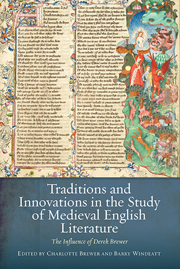 Traditions and Innovations in the Study of Medieval English Literature
Traditions and Innovations in the Study of Medieval English Literature Published online by Cambridge University Press: 05 September 2013
Storytelling may be one of the very oldest human activities after the acquisition of language. Language is a symbolic process that produces signifying sounds as a substitute for the things themselves; story allows those sounds to be linked to describe a sequence of events that are not present as fact but that have their existence in the mind, as memory or conjecture or imagination. The very earliest cave paintings or rock art suggest pre-existing stories of some kind behind them. Studies of memory formation and of childhood psychology suggest that it is the ability to form narratives, to shape random events into the syntax of a story, that enables an infant to make sense of the world it finds itself in.
Derek Brewer was increasingly fascinated by story and storytelling – not just in particular stories, though his delight in those masters of narrative Chaucer and Malory makes that evident, but in the principles underlying story itself. That is apparent even in the titles of some of his publications, in his Symbolic Stories: Traditional Narratives of the Family Drama in English Literature (1980), or in the collection of articles he entitled Chaucer: The Poet as Storyteller (1984b). That contains a reprint of his earlier Gollancz lecture, delivered in 1974, ‘Towards a Chaucerian Poetic’, which is perhaps his most concise and detailed consideration of the principles underlying story as such, and of the importance of story – especially traditional forms of narrative, folk-tales, fairy-tales and many medieval romances – over whatever meanings might be attached to them.
To save this book to your Kindle, first ensure no-reply@cambridge.org is added to your Approved Personal Document E-mail List under your Personal Document Settings on the Manage Your Content and Devices page of your Amazon account. Then enter the ‘name’ part of your Kindle email address below. Find out more about saving to your Kindle.
Note you can select to save to either the @free.kindle.com or @kindle.com variations. ‘@free.kindle.com’ emails are free but can only be saved to your device when it is connected to wi-fi. ‘@kindle.com’ emails can be delivered even when you are not connected to wi-fi, but note that service fees apply.
Find out more about the Kindle Personal Document Service.
To save content items to your account, please confirm that you agree to abide by our usage policies. If this is the first time you use this feature, you will be asked to authorise Cambridge Core to connect with your account. Find out more about saving content to Dropbox.
To save content items to your account, please confirm that you agree to abide by our usage policies. If this is the first time you use this feature, you will be asked to authorise Cambridge Core to connect with your account. Find out more about saving content to Google Drive.